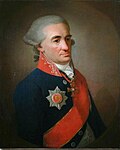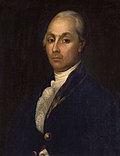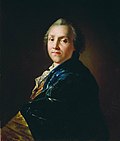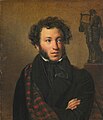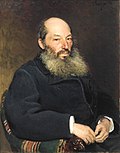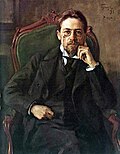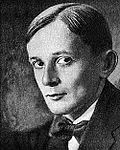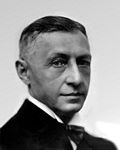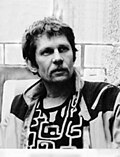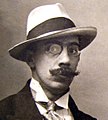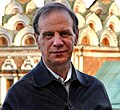Russian literature

| Part of a series on the |
| Culture of Russia |
|---|
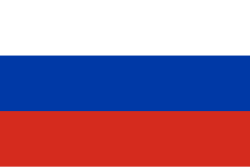 |
| Society |
|
| Topics |
|
| Symbols |
| Part of a series on the |
| Culture of the Soviet Union |
|---|
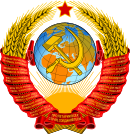 |
| People |
| Languages |
|
Traditions |
| Cuisine |
| Festivals |
| Literature |
| Music |
|
Sport |
Russian literature refers to the literature of Russia, its émigrés, and to Russian-language literature.[1] Major contributors to Russian literature, as well as English for instance, are authors of different ethnic origins, including bilingual writers, such as Kyrgyz novelist Chinghiz Aitmatov.[1] At the same time, Russian-language literature does not include works by authors from the Russian Federation who write exclusively or primarily in the native languages of the indigenous non-Russian ethnic groups in Russia, thus the famous Dagestani poet Rasul Gamzatov is omitted.
The roots of Russian literature can be traced to the
After the
The post-Soviet end of the 20th century was a difficult period for Russian literature, with few distinct voices. Among the most discussed authors of this period were novelists Victor Pelevin and Vladimir Sorokin, and the poet Dmitri Prigov. In the 21st century, a new generation of Russian authors appeared, differing greatly from the postmodernist Russian prose of the late 20th century, which led critics to speak about "new realism".
Russian authors have significantly contributed to numerous literary genres. Russia has five Nobel Prize in Literature laureates. As of 2011, Russia was the fourth largest book producer in the world in terms of published titles.[2] A popular folk saying claims Russians are "the world's most reading nation".[3][4] As the American scholar Gary Saul Morson notes, "No country has ever valued literature more than Russia."[5]
Medieval and early modern era

Scholars typically use the term Old Russian literature, in addition to the terms medieval Russian literature and early modern Russian literature,[6] or pre-Petrian literature,[7] to refer to Russian literature until the reforms of Peter the Great, tying literary development to historical periodization. The term is generally used to refer to all forms of literary activity in what is often called Old Russia from the 11th to 17th centuries.[8][9]

Literary works from this period were often written in the Russian recension of Church Slavonic with varying amounts of the Russian or more broadly East Slavic vernacular.[10][11] At the same time, the native Old Russian vernacular was not only language of oral literature, such as epic poems (bylina) or folksongs,[12] but it was also perfectly legitimate as written for practical purposes, such as decrees, laws (the Russkaya Pravda, the 11th–12th century, and other codes), letters (for example, the unique pre-paper birch bark manuscripts, the 11th–15th centuries, in the Old Novgorod dialect), ambassadorial messages,[10] "in chronicles or military tales whose language is fundamentally the Russian vernacular."[10]
Old Russian "bookish" literature traces its beginnings to the introduction of Old Church Slavonic in Kievan Rus' as a liturgical language in the late 10th century following Christianization.[13][14] The East Slavs soon developed their own literature, and the oldest dated manuscript of Early Russian as well all-Slavic literature that has survived to this day is the Novgorod Codex or Novgorod Psalter written c. 1000, unearthed in 2000 at Veliky Novgorod, containing four wooden tablet pages filled with wax.[15] Another earliest Russian book is the Ostromir Gospels written in 1056–1057, which belongs to the set of liturgical texts that were translated from other languages.[16][17]
The discord of the princes ruined them against the Pagans. For, brother spake to brother;—"This is mine, and that is also mine." And the princes began to pronounce of a paltry thing, 'this is great'; and themselves amongst them to forge feuds; and the heathens from all sides advanced with victories against the Russian land.
The main type of Old Russian historical literature were chronicles, most of them anonymous.
In the 16th century, reflecting the political centralization and unification of the country under the tsar, chronicles were updated and codified, the Russian Orthodox Church began issuing its decrees in the Stoglav, and a large compilation called the Great Menaion Reader collected both the more modern polemical texts and the hagiographical and patristic legacy of Old Russia.[29] The Book of Royal Degrees codified the cult of the tsar, the Domostroy laid down the rules for family life, and other texts such as the History of Kazan were used to justify the actions of the tsar.[30] The Tale of Peter and Fevronia were among the original tales of this period, and Russian tsar Ivan IV wrote some of most original works of 16th-century Russian literature.[30] The Time of Troubles marked a turning point in Old Russian literature as both the church and state lost control over the written word, which are reflected in the texts of writers such as Avraamy Palitsyn who developed a literary technique for representing complex characters.[31]
In the second half of the 17th century, the literature of Baroque took shape, primarily due to the initiative of tsar Alexis of Russia, who wanted to open a court theatre in 1672. Its director and playwright was Johann Gottfried Gregorii, a German-Russian pastor, who wrote, in particular, the 10-hour play The Action of Artaxerxes. The poetry and dramaturgy of Symeon of Polotsk and Demetrius of Rostov contributed to the development of the Russian version of the Baroque.[32]
In the 17th century, when bookmen from the
"Will these sufferings go on a long time, Archpriest?" And I said, "Markovna, right up to our very death." And so she sighed and answered, "Good enough, Petrovič, then let's be getting on."
The Life of the Archpriest Avvakum—an outstanding novelty autobiography written by the one of leaders of the 17th-century religious dissidents Old Believers Avvakum—is considered masterpiece of pre-Petrian literature, which blends high Old Church Slavonic with low Russian vernacular and profanity without following literary canons.[36]
Age of Enlightenment, 18th century
After taking the throne at the end of the 17th century,
While Trediakovsky's approach to writing is often described as highly erudite, the young writer and scholarly rival to Trediakovsky, Alexander Petrovich Sumarokov, 1717–1777, was dedicated to the styles of French classicism.[37] Sumarokov's interest in the form of the 17th-century French literature mirrored his devotion to the westernizing spirit of Peter the Great's age. Although he often disagreed with Trediakovsky, Sumarokov also advocated the use of simple, natural language in order to diversify the audience and make more efficient use of the Russian language. Like his colleagues and counterparts, Sumarokov extolled the legacy of Peter I, writing in his manifesto Epistle on Poetry, "The great Peter hurls his thunder from the Baltic shores, the Russian sword glitters in all corners of the universe".[40] Peter the Great's policies of westernization and displays of military prowess naturally attracted Sumarokov and his contemporaries.
The influence of Peter I and debates over the function and form of literature as it related to the Russian language in the first half of the 18th century set a stylistic precedent for the writers during the reign of
Others, however, picked topics less offensive to the autocrat. the historian and writer Nikolay Karamzin, 1766–1826, the key figure of literary sentimentalism in Russia,[7][44] for example, is known for his advocacy of Russian writers adopting traits in the poetry and prose like a heightened sense of emotion and physical vanity, considered to be feminine at the time as well as supporting the cause of female Russian writers.[45][46][47] Karamzin's call for male writers to write with femininity was not in accordance with the Enlightenment ideals of reason and theory, considered masculine attributes. His works were thus not universally well received; however, they did reflect in some areas of society a growing respect for, or at least ambivalence toward, a female ruler in Catherine the Great. This concept heralded an era of regarding female characteristics in writing as an abstract concept linked with attributes of frivolity, vanity and pathos.
Some writers, on the other hand, were more direct in their praise for Catherine II.
Denis Fonvizin, an author primarily of comedy, approached the subject of the Russian nobility with an angle of critique. Fonvizin felt the nobility should be held to the standards they were under the reign of Peter the Great, during which the quality of devotion to the state was rewarded. His works criticized the current system for rewarding the nobility without holding them responsible for the duties they once performed. Using satire and comedy, Fonvizin supported a system of nobility in which the elite were rewarded based upon personal merit rather than the hierarchal favoritism that was rampant during Catherine the Great's reign.[48]
-
Mikhail Sobakin
Golden Age
I lay, and heard the voice of God:
"Arise, oh prophet, watch and hearken,
And with my Will thy soul engird,
Through lands that dim and seas that darken,
Burn thou men's hearts with this, my Word."
The 19th century is traditionally referred to as the "Golden Era" of Russian literature.[50] The period of Romantic literature saw the flowering of poetic talent, in particular; the names of Vasily Zhukovsky and his protégé Alexander Pushkin came to the fore.[51] Pushkin is credited with crystallizing the literary Russian language and introducing a new level of artistry to Russian literature. His best-known work is a pre-realistic novel in verse, Eugene Onegin (1833).[52] Other poets important to the movement include Konstantin Batyushkov, Pyotr Vyazemsky, Yevgeny Baratynsky, Fyodor Tyutchev and Dmitry Venevitinov, along with the novelists Antony Pogorelsky, Alexander Bestuzhev and "Russian Hoffmann" Vladimir Odoyevsky. Tyutchev is best known for the following verse:
Who would grasp Russia with the mind?
For her no yardstick was created:
Her soul is of a special kind,
By faith alone appreciated.— Fyodor Tyutchev, Who would grasp Russia with the mind? (1866), translated by John Dewey[53]
An entire new generation of Romantic poets and novelists followed in Pushkin's steps. Mikhail Lermontov wrote the narrative poem Demon in 1829–39, which chronicled the love of a Byronic Demon for a mortal woman, as well as A Hero of Our Time (1841), which is often considered to be the first Russian psychological novel. Aleksey K. Tolstoy and Afanasy Fet were also significant.[51]
As Romanticism came to command the stage,
Plants, birds, insects and children were equally joyful. Only men—grown-up men—continued cheating and tormenting themselves and each other. People saw nothing holy in this spring morning, in this beauty of God's world—a gift to all living creatures—inclining to peace, good-will and love, but worshiped their own inventions for imposing their will on each other.
Mikhail Saltykov-Shchedrin is known for his satirical chronicle The History of a Town (1870) and the family saga The Golovlyov Family (1880), which are considered his masterpieces. Nikolai Leskov is best remembered for his shorter fiction and for his (together with Pavel Melnikov) unique skaz techniques, namely oral form of narrative stylization. Late in the century Anton Chekhov emerged as a master of the short story as well as a leading international dramatist.
Other important 19th-century developments included
-
Nikolai Nekrasov
-
Fyodor Dostoyevsky
-
Mikhail Saltykov-Schedrin
Silver Age
Night, street and streetlight, drug store,
The purposeless, half-dim, drab light.
For all the use live on a quarter century —
Nothing will change. There's no way out.
You'll die — and start all over, live twice,
Everything repeats itself, just as it was:
Night, the canal's rippled icy surface,
The drug store, the street, and streetlight.
The 1890s and the beginning of the 20th century ranks as the Silver Age of Russian poetry.
The Russian symbolism was the first Silver Age development in the 1890s. It arose enough separately from West European symbolism, emphasizing mysticism of Sophiology and defamiliarization. Its most significant figures included philosopher and poet Vladimir Solovyov (1853–1900), poets and writers Valery Bryusov (1873–1924), Fyodor Sologub (1863–1927), Vyacheslav Ivanov (1866–1949), Konstantin Balmont (1867–1942), and figures of the new wave generation Alexander Blok (1880–1921) with Andrei Bely (1880–1934).[57][7][58]

While the Silver Age is considered to be the development of the 19th-century Russian Golden Age literature tradition, some modernist and
Though the Silver Age is famous mostly for its poetry, it produced some first-rate novelists and short-story writers, such as
In 1915/16, the school of
An integral part of the literature of the Silver Age is Russian philosophy, which reached its peak at this time (see works of Nikolai Berdyaev, Pavel Florensky, Semyon Frank, Nikolay Lossky, Vasily Rozanov, and others).
-
Andrey Bely
-
Aleksandr Kuprin
Soviet era
Early post-Revolutionary era

Tramp squares with rebellious treading!
Up heads! As proud peaks be seen!
In the second flood we are spreading
Every city on earth will be clean.
The first years of the Soviet regime after the
Following the establishment of
One of the most popular Soviet poets during the 1920s was Nikolai Tikhonov (1896–1979), a future important figure of Stalinist era, well-known for his Ballad About Nails,[70] as follows:
Could nails from such people be fashioned, you’d see
That no tougher nails in the world would there be.— Nikolai Tikhonov, Ballad of the Nails (1919), translated by Peter Tempest[71]
Émigré writers
I am an American writer, born in Russia, educated in England, where I studied French literature before moving to Germany for fifteen years. ... My head speaks English, my heart speaks Russian, and my ear speaks French.
Usually, Russian émigré literature is understood as the works of the
-
Lidia Tcherminskaia
Stalinist era
In the 1930s, Socialist realism became the predominant official trend in the Soviet Union. Writers like those of the Serapion Brothers group (1921–), who insisted on the right of an author to write independently of political ideology, were forced by authorities to reject their views and accept socialist realist principles. Some 1930s writers, such as Osip Mandelstam, Daniil Kharms, leader of Oberiu, Leonid Dobychin, Mikhail Bulgakov, author of The White Guard (1923) and The Master and Margarita (1928–1940), and Andrei Platonov, author of novels Chevengur (1928) and The Foundation Pit (1930) were attacked by the official critics as "formalists," "naturalists" and ideological enemies and wrote with little or no hope of being published. Such remarkable writers as Isaac Babel, Boris Pilnyak, Nikolai Klyuev, Sergey Klychkov, Pyotr Oreshin and Artyom Vesyoly, who continued to publish their works but could not get used to the socrealist principles by the end of the 1930s, were executed on fabricated charges, and Osip Mandelstam, Daniil Kharms and Alexander Vvedensky died in prison.[56][74]
The return from emigration such famous authors as Aleksey Tolstoy, Maxim Gorky, and Ilya Ehrenburg was a major propaganda victory for the Soviets.
After his return to Russia Maxim Gorky was proclaimed by the Soviet authorities as "the founder of Socialist Realism". His novel Mother (1906), which Gorky himself considered one of his biggest failures, inspired proletarian writers to found the socrealist movement. Gorky defined socialist realism as the "realism of people who are rebuilding the world" and pointed out that it looks at the past "from the heights of the future's goals", although he defined it not as a strict style (which is studied in Andrei Sinyavsky's essay On Socialist Realism), but as a label for the "union of writers of styles", who write for one purpose, to help in the development of the new man in socialist society. Gorky became the initiator of creating the Writer's Union, a state organization, intended to unite the socrealist writers.[75] Despite the official reputation, Gorky's post-revolutionary works, such as the novel The Life of Klim Samgin (1925–1936) can't be defined as socrealist, but modernist.[76][73]
Andrei Bely (1880–1934), author of Petersburg (1913/1922), a well-known modernist writer, also was a member of Writer's Union and tried to become a "true" socrealist by writing a series of articles and making ideological revisions to his memoirs, and he also planned to begin a study of Socialist realism. However, he continued writing with his unique techniques.[77] Although he was actively published during his lifetime, his major works would not be reissued until the end of the 1970s.
Valentin Kataev, who began publishing before the Revolution, is the author of the first Soviet "industrial novel" Time, Forward! (1932) and the classic 1946 short story Our Father.[78]
Mikhail Sholokhov (1905–1984) was one of the most significant figures in the official Soviet literature. His main socrealist work is Virgin Soil Upturned (1935), a novel in which Sholokhov glorifies the collectivization. However, his best-known and the most significant literary achievement is Quiet Flows the Don (1928–1940), an epic novel which realistically depicts the life of Don Cossacks during the First World War, the Russian Revolution, and Russian Civil War.[56][79]
Nikolai Ostrovsky's novel How the Steel Was Tempered (1932–1934) has been among the most popular works of literary socrealism, with tens of millions of copies printed in many languages around the world. In China, various versions of the book have sold more than 10 million copies.[80] In Russia more than 35 million copies of the book are in circulation.[81] The book is a fictionalized autobiography of Ostrovsky's life: he had a difficult working-class childhood, became a Komsomol member in July 1919 and volunteered to join the Red Army. The novel's protagonist, Pavel Korchagin, represented the "young hero" of Russian literature: he is dedicated to his political causes, which help him to overcome his tragedies.[82] Alexander Fadeyev (1901–1956) was also a well-known Socialist realism writer, the chairman of the official Writer's Union during Stalinist era.[56][74] His novel The Rout (1927) deals with the partisan struggle in Russia's Far East during the Russian Revolution and Civil War of 1917–1922. Fadeyev described the theme of this novel as one of a revolution significantly transforming the masses.[56][74]
In the 1930s, Konstantin Paustovsky (1892–1968), an influenced by neo-Romantic works of Alexander Grin master of landscape prose, a singer of the Meshchera Lowlands, and already in the post-Stalin years a multiple nominee for the Nobel Prize in Literature, joined the ranks of leading Soviet writers.fantastic.[83]
Novelist and playwright Leonid Leonov, despite the fact that he was considered by authorities to be one of the pillars of socialist realism,[84] during the Stalin years, created a forbidden novella about emigrats Eugenua Ivanovna (1938), a play about the Chekist purges, The Snowstorm (1940), briefly permitted and then also forbidden, and a novel, The Russian Forest (1953), where ecological issues were perhaps touched upon for the first time in Soviet literature. Over the course of forty years (1940–1994), he wrote a huge philosophical and mystical novel, "The Pyramid", which was finished and published in the year of the author's death.
Wait for me and I'll come back,
Escaping every fate!
‘Just got lucky!’ they will say,
Those that didn't wait.
They will never understand
How, amidst the strife,
By your waiting for me, dear,
You had saved my life!
The cult figures of the literature of the Second World War were the
Boris Polevoy is the author of the Story About a True Man (1946), based on the life of World War II fighter pilot Aleksey Maresyev, which was an immensely popular.[88]
Late Soviet era
So what is beauty? And why does the human race
Keep up its worship, whether valid or misguided?
Is it a vessel holding empty space,
Or is it fire shimmering inside it?
After the end of World War II Nobel Prize-winning Boris Pasternak (1890–1960) wrote a novel Doctor Zhivago (1945–1955). Publication of the novel in Italy caused a scandal, as the Soviet authorities forced Pasternak to renounce his 1958 Nobel Prize and denounced as an internal White emigre and a Fascist fifth columnist. Pasternak was expelled from the Writer's Union.
The majority of members of the Writers' Union (
And however long the blizzard blows, whether it's three days or a week, every single day is counted as a day off, and the men are turned out to work Sunday after Sunday to make up for lost time.
The
I don’t know about the rest of you,
but I feel the cruelest
nostalgia — not for the past —
but nostalgia for the present.— Andrei Voznesensky, Nostalgia for the Present (1976), translated by Vera Dunham and H. W. Tjalsma[91]
Such exponents of neo-Acmeist poetry as Arseny Tarkovsky, Semyon Lipkin, David Samoylov, Alexander Kushner and Oleg Chukhontsev,[92] the representatives "quiet poetry" Anatoly Zhigulin, Stanislav Kunyaev, Nikolay Rubtsov and Yury Kuznetsov, and also Gleb Gorbovsky, bard Novella Matveyeva, Yunna Morits, and Gleb Semenov's lyrical poetry also stood apart from the socrealist mainstream.[67]
The
Since 1985/86, the
-
Viktoria Tokareva
Soviet nonconformism
Some writers dared to oppose Soviet ideology, like short-story writer
Modernist and Postmodern dissident literature[104] was related and partially coincided with the Soviet nonconformist art movement. From 1953 to 1957, the Mansard Group—first unofficial poetry group—existed till its leader Leonid Chertkov (1933–2000) was imprisoned, among other members Galina Andreeva (1933–2016) and Stanislav Krasovitsky (b. 1935). Another poetry group of '50s in Leningrad was the Philological School that included Mikhail Eremin (1936–2022), Sergey Kulle (1936–1984), Leonid Vinogradov (1936–2004) and poet and artist Vladimir Uflyand (1937–2007). Some poets were both artists or participants and inspirers of art groups, such as Evgenii Kropivnitsky (1893–1979), Igor Kholin, Genrikh Sapgir, Vilen Barskyi (1930–2012), Roald Mandelstam (1932–1961), Vsevolod Nekrasov (1934–2009), Mikhail Eremin (1936–2022), Igor Sinyavin (1937–2000), Alexei Khvostenko (1940–2004), Dmitry Prigov (1940–2007), Kari Unksova (1941–1983), Ry Nikonova (1942–2014), Oleg Grigoriev (1943–1992), Valery Kholodenko (1945–1993), Serge Segay (1947–2014), and Vladimir Sorokin (b. 1955).[105]
But the late 1950s thaw did not last long. In the 1970s, some of the most prominent authors were not only banned from publishing but were also prosecuted for their anti-Soviet sentiments, or for
In 1960s arose unofficial Soviet second Russian avant-garde and Russian postmodernism. In 1965–72, at Leningrad existed the avantgardist Absurdist poetic and writing group "Khelenkuts", which included Vladimir Erl and Aleksandr Mironov, among others. Andrei Bitov was Postmodernism first proponent. In 1970, Venedikt Erofeyev's surrealist postmodern prose poem Moscow-Petushki was published via samizdat.[107][108] The Soviet emigrant Sasha Sokolov wrote surrealist A School for Fools in 1973 and the completely postmodern novel Between Dog and Wolf in 1980.[109] Other remarkable postmodern novels were Eduard Limonov's It's Me, Eddie, Vladimir Voinovich's The Life and Extraordinary Adventures of Private Ivan Chonkin, Vasily Aksyonov's The Island of Crimea and Vladimir Sorokin's The Norm. Sergei Dovlatov and Yevgeni Popov predominantly wrote short stories. Since '70s there were such postmodern unofficial movements as Moscow Conceptualists with elements of concrete poetry[110][111] (Vsevolod Nekrasov, Dmitry Prigov, writer and literary scholar Viktor Yerofeyev, Lev Rubinstein, Timur Kibirov, early Vladimir Sorokin) and Metarealism, namely metaphysical realism, used complex metaphors which they called meta-metaphors (Konstantin Kedrov, Viktor Krivulin, Elena Katsyuba, Ivan Zhdanov, Elena Shvarts,[112] Vladimir Aristov, Aleksandr Yeryomenko, scholar Svetlana Kekova, Yuri Arabov, Alexei Parshchikov, Sergei Nadeem and Nikolai Kononov).[113][114][115] Arkadii Dragomoshchenko is considered the foremost representative of the Language Poets in Russian literature.[116] In Yeysk, there was the "Transfurist" group of mixing verbal, sound and visual poetry (Ry Nikonova and Serge Segay, among others). As mentioned Leonid Vinogradov, as well as members of List of characters group Mikhail Faynerman and Ivan Akhmetyev were exponents of Minimalist verse. The banned from publishing Chuvash and Russian poet Gennadiy Aygi had been creating experimental surrealist verses[103] as follows:
And we utter a few words — simply because
we’re scared of silence
and deem any movement dangerous
Among other underground poets and writers were the exponent of stream of consciousness prose Pavel Ulitin, Dmitry Avaliani, Yevgeny Kharitonov, economist and poet Yevgeny Saburov, Elena Ignatova, Mikhail Aizenberg and Yevgeny Bunimovich, as well partially banned Vladimir Dudintsev, Fazil Iskander and Olga Sedakova.
-
Vladimir Erl
-
Svetlana Kekova
Popular Soviet genres

Children's literature in the Soviet Union counted as a major genre because of its educational role. A large share of early-Soviet children's books were poems:
While fairy tales were relatively free from ideological oppression, the realistic children's prose of the Stalinist era was highly ideological and pursued the goal to raise children as
The famous and widely popular satirists were Mikhail Zoshchenko, Valentin Kataev and the writing tandem Ilf and Petrov, described problems of post-Revolutionary Soviet society.[74]
Soviet
Since the
Space opera was less developed, since both state censors and serious writers watched it unfavorably. Nevertheless, there were moderately successful attempts to adapt space westerns to Soviet soil. The first was Alexander Kolpakov with "Griada", after came Sergey Snegov with "Men Like Gods", among others.[citation needed]
A specific branch of both science fiction and children's books appeared in mid-Soviet era: the children's science fiction. It was meant to educate children while entertaining them. The star of the genre was Bulychov, who, along with his adult books, created children's space adventure series about
Mystery was another popular genre. Detectives by Vayner Brothers and spy novels by Yulian Semyonov were best-selling,[118] and many of them were adapted into film or TV in the 1970s and 1980s.
Any sort of fiction that dealt with the occult, either
-
Alexander Belayev
-
Boris Strugatsky
Bronze Age
Post-Soviet 1990s
The end of the 20th century proved a difficult period for Russian literature, with relatively few distinct voices. Although the limited censorship of the period of glasnost was lifted, de facto since 1989 in the Soviet Union, de jure in 1990, and writers could now freely express their thoughts, the political and economic chaos of the 1990s affected the book market and literature heavily. The book printing industry descended into crisis, the number of printed book copies dropped several times in comparison to Soviet era, and it took about a decade to revive.[120]
Among the most discussed figures of this period were authors Victor Pelevin (b. 1962), disputably related to postmodernism[121] and the New Sincerity movement,[122] who is author of the Zen-inspired Chapayev and the Void, "the first novel which takes place in an absolute vacuum," postmodernist[123] novelist and playwright Vladimir Sorokin (b. 1955, the novels Their Four Hearts and Blue Lard), who started an underground writing career still in the early 80s,[124] and the conceptualist[123] poet Dmitry Prigov (1940–2007). Among other significant Postmodern works are Lyudmila Petrushevskaya's novella The Time: Night, Anatoly Korolyov's novel Eron, Yevgeni Popov's novel The Real Story of the "Green musicians", Tatyana Tolstaya's novel The Stynx, Vladimir Sharov's historiosophical prose as well the Israeli literary scholar and later novelist Alexander Goldstein's variable essays.[120]
The tradition of the classic Russian realistic novel with
A relatively new trend in Russian literature is that female short story writers mentioned Viktoriya Tokareva and Lyudmila Petrushevskaya or Tatyana Tolstaya, and novelists Lyudmila Ulitskaya, Nina Sadur, Irina Polyanskaya (1952–2004), Dina Rubina or Valeriya Narbikova (b. 1958) have come into prominence.[125][126]
Detective stories and thrillers have proven a very successful genre of new Russian literature: in the 1990s serial detective novels by Alexandra Marinina, Polina Dashkova and Darya Dontsova were published in millions of copies. In the next decade Boris Akunin who wrote more sophisticated popular fiction, e.g. a series of novels about the 19th century sleuth Erast Fandorin, was eagerly read across the country.
Science fiction was always well selling, albeit second to
Russian poetry of that period produced a number of avant-garde greats. The Moscow Conceptualists and followers of Concrete poetry, such as mentioned Dmitry Prigov, Lev Rubinstein, Anna Alchuk and Timur Kibirov (also novelist and literary scholar Viktor Yerofeyev), and the members of the Lianosovo group of nonconformist poets, notably Genrikh Sapgir, Igor Kholin and Vsevolod Nekrasov, who previously chose to refrain from publication in Soviet periodicals, became very influential, especially in Moscow,[128][111] and the same goes for another masterful experimental neo-surrealist Chuvash and Russian poet, Gennadiy Aygi.[128] Also popular were poets following some other poetic trends, e.g. members of "neo-Baroque" poetry school (not to be confused with neo-Baroque architecture) Ivan Zhdanov, Elena Shvarts, Aleksandr Yeryomenko and Alexei Parshchikov, Konstantin Kedrov and Elena Katsuba from DOOS, scholar Svetlana Kekova, Sergei Nadeem and Nikolai Kononov from Saratov club Cocoon, Vladimir Aristov, Yuri Arabov and other representatives of the 1970–80s Metarealism, who all used complex metaphors which they called meta-metaphors;[128][115] in St. Petersburg, members of New Leningrad Poetry School that included not only the famous Joseph Brodsky but also Viktor Krivulin, Sergey Stratanovsky and Elena Shvarts, and such members of Philological School as Mikhail Eremin, Leonid Vinogradov, Vladimir Uflyand and the Russian-American scholar Lev Loseff, were prominent first in the Soviet-times underground—and later in mainstream poetry;[103][128] minimalist verse was represented since 1970s by members of List of characters group Mikhail Faynerman, Ivan Akhmetyev and later by Alexander Makarov-Krotkov; in 1992 emerged, the Meloimaginist group related to previous Imaginism and included such poets and novelists as Russian-Irish bilingual Anatoly Kudryavitsky and Ludmila Vaturina; among other names, poets with nonconformist background Russian-Austrian musicolog Elizaveta Mnatsakanova, Galina Andreeva, Leonid Chertkov, Stanislav Krasovitsky, Dmitry Avaliani, Ry Nikonova, economist Yevgeny Saburov, Russian-Israeli author Elena Ignatova, Mikhail Aizenberg, Yevgeny Bunimovich and Dimitry Grigoriev, also poet and writer Nikolaĭ Baĭtov, the Russian-German scholar Sergey Biryukov with futurist and surrealist background,[128] Irina Iermakova, Vitaly Kalpidi, the unable to publish during Soviet years scholar Olga Sedakova, and Boris Khersonsky. Notable poets of younger generation are Elena Fanailova (b. 1962), German Lukomnikov (b. 1962), Vera Pavlova (b. 1963), Grigory Dashevsky (1964–2013), Sergei Kruglov (b. 1966), Dmitry Kuzmin (b. 1968), Arseniy Rovinsky (b. 1968), Asya Shneiderman (b. 1968), Maxim Amelin (b. 1970), Mikhail Gronas (b. 1970), Fyodor Svarovsky (b. 1971), Stanislav Lvovsky (b. 1972), Maria Stepanova (b. 1972), Alina Vitukhnovskaya (b. 1973),[128] Inga Kuznetsova (b. 1974), Boris Ryzhy (1974–2001), Shish Bryansky (b. 1975), Linor Goralik (b. 1975), Kirill Medvedev (b. 1975), and Polina Barskova (b. 1976).[129]
-
Ivan Akhmetyev
-
Sergey Biryukov
-
Elena Ignatova
-
Konstantin Kedrov
-
Anatoly Korolyov
-
Pavel Krusanov
-
Valeriya Narbikova
-
Irina Polyanskaya
-
Aleksey Varlamov
21st century
—Why has our planet been selected?
—It has not been selected. It was created as a prison from the start.

At the beginning of the 21st century,
Among the debutants in prose are Eduard Kochergin (b. 1937) with his novels Angel's Doll and Baptized with Crosses, Alexei Ivanov (b. 1969) known for his novel The Heart of Parma, a Russian-Israeli writer and poet in the philosophical-symbolic vein Alexander Ilichevsky (b. 1970), who wrote The Persian and the Newton's Drawing,[131][132][133] the author of novel The Librarian Mikhail Elizarov (b. 1973), and German Sadulaev (b. 1973) with the book I am a Chechen![131] In the second decade of the century, the following novelists gained fame: Eugene Vodolazkin (b. 1964) for The Laurus (one of ten best world novels about God by The Guardian version),[134] Sofia Sinitskaya (b. 1972), the author of the neutral novel Black Siberia on Russo-Ukrainian War,[135] and Alexei Salnikov (b. 1978) for his hallucinatory The Petrovs in and Around the Flu (regarded as a rare outstanding text, see also the film Petrov's Flu).[136] In the form of popular fiction, post-apocalyptic novels of Dmitry Glukhovsky (b. 1979) are successful.
Almost all of the authors named criticized Putinism and have left Russia. After 2022, they have been "canceled" and their books have been withdrawn from a number of Russian booksellers.[137] Examples of active supporters of the political regime among eminent writers are poet Yunna Morits (b. 1937)[138] and nationalists Alexander Prokhanov (b. 1938),[139] Yurii Poliakov (b. 1954)[140] Pavel Krusanov (b. 1961)[141] and Zakhar Prilepin (b. 1975).[131][142]
A new generation of Russian authors appeared, differing greatly from the postmodernist Russian prose of the late 20th century, which led critics to speak about "new realism" as one of several contemporary literary trends (Pavel Basinsky (b. 1961), Aleksey Varlamov (b. 1963), Alexei Ivanov, Andrei Rubanov (b. 1969), Oleg Pavlov (1970–2018), Andrei Ivanov (b. 1971), Roman Senchin (b. 1971), German Sadulaev, Zakhar Prilepin, and others).
among the shining/(branching) still people/
to create a human being while you are not
a human.
The treasury of Russian poetry has been replenished with works by both senior masters, like Oleg Chukhontsev (b. 1938), and such debutants as Natalia Azarova (b. 1956), Vsevolod Emelin (b. 1959), Tatiana Grauz (b. 1964), Andrei Polyakov (b. 1968), Andrei Sen-Senkov (b. 1968), Tania Skarynkina (b. 1969), Igor Bulatovsky (b. 1971), Vlad Malenko (b. 1971), Andrei Rodionov (b. 1971), Anna Glazova (b. 1973), Victor Ivaniv (1977–2015), Eugenia Rits (b. 1977), Ekaterina Simonova (b. 1977), Pavel Goldin (b. 1978), Nika Skandiaka (b. 1978), Anna Zolotaryova (b. 1978), Roman Osminkin (b. 1979), Sergey Tenyatnikov (b. 1981), Vasily Borodin (1982–2021), Tatiana Moseeva (b. 1983), Alla Gorbunova (b. 1985), Vera Polozkova (b. 1986), Yevgenia Suslova (b. 1986), Nikita Ivanov (b. 1989), Galina Rymbu (b. 1990), Daria Serenko (b. 1993), and Maria Malinovskaya (b. 1994). The main trends of contemporary poetry are neo-surrealist fragmentation, as well as the return of plot poetry among representatives of the “New Epic” movement.[129][143]
Two new literary prizes were established and became influential: the Big Book and the National Bestseller.[132]
-
Natalia Azarova
-
Alla Gorbunova
-
Tatiana Grauz
-
Alexandr Ilichevsky
-
Eduard Kochergin
-
Alexei Salnikov
-
Anna Zolotaryova
List of movements
The following is a list of international and regiinal literary movements, those represented in Russian literature. Their notable members ordering is predominantly by precedence.
Russian Nobel laureates in literature
This section is in prose. is available. (February 2017) |
- Ivan Bunin (1933)
- Boris Pasternak (1958)
- Mikhail Sholokhov (1965)
- Aleksandr Solzhenitsyn (1970)
- Joseph Brodsky (1987)
- Svetlana Alexievich (2015)
See also
- List of Russian-language novelists
- List of Russian-language playwrights
- List of Russian-language poets
- List of Russian-language writers
- List of Russian philosophers
- Russian fairy tale
- Russian science fiction and fantasy
- Russian literature of Ukraine
- Pushkin House
- Anti-Booker prize
- Russian Booker Prize
- Geographical distribution of Russian speakers
References
- ^ a b Cornwell & Christian 1998, p. vii.
- ^ Moscow International Book Fair[usurped]. Academia-rossica.org. Retrieved on 2012-06-17.
- ^ The Moscow Times The most reading country in the world? Archived 2013-05-10 at the Wayback Machine
- ^ Rivkin-Fish, Michele R.; Trubina, Elena (2010). Dilemmas of Diversity After the Cold War: Analyses of "Cultural Difference" by U.S. and Russia-Based Scholars. Woodrow Wilson Center.
"When mass illiteracy was finally liquidated in the first half of the twentieth century, the proud self-image of Russians as "the most reading nation in the world" emerged – where reading meant, and still means for many, the reading of literature". - ^ Morson 2023, p. 41.
- ^ Kahn et al. 2018, p. 13.
- ^ a b c d Morson, Gary Saul. "Russian literature". Encyclopædia Britannica Online. Retrieved 2024-05-19.
- ^ Cornwell 2001, p. 13.
- ^ Terras 1985, p. 316.
- ^ a b c Cornwell & Christian 1998, p. 5.
- ^ Matthews 2013, pp. 128–132.
- ^ Cornwell & Christian 1998, pp. 3–4.
- ^ Moser 1992, p. 3, "The Literature of Old Russia, 988–1730".
- ^ Kahn et al. 2018, pp. 20–21.
- ^ Zaliznyak & Yanin 2001.
- ^ Moser 1992, pp. 3–4.
- ^ Vinokur 1971, p. 34.
- ^ The Tale of the Armament of Igor. A.D. 1185. A Russian Historical Epic, ed. and trans. by Leonard A. Magnus, London: Oxford University Press, 1915 – via Sacred-texts.com
{{citation}}: CS1 maint: others (link) - ^ Kahn et al. 2018, pp. 27–29.
- ^ Kahn et al. 2018, p. 28.
- ^ Moser 1992, p. 12.
- ISBN 978-0-87779-042-6.
- ^ Moser 1992, p. 9.
- ^ Moser 1992, p. 22.
- ^ Moser 1992, p. 11.
- ^ Moser 1992, p. 23.
- ^ Moser 1992, pp. 1–44, "The Literature of Old Russia, 988–1730".
- ^ Moser 1992, pp. 1–44.
- ^ Moser 1992, pp. 30–31.
- ^ a b Moser 1992, p. 31.
- ^ Moser 1992, p. 33.
- ^ Kahn et al. 2018, pp. 153–157.
- ^ Moser 1992, p. 34.
- ^ a b Moser 1992, p. 35.
- ISBN 0-930042-33-6
- ^ Kahn et al. 2018, pp. 142–145.
- ^ a b c Moser 1992, pp. 45–91, "The Eighteenth Century: Neoclassicism and the Enlightenment, 1730–1790".
- ^ Terras 1985, pp. 221–223.
- ^ Terras 1985, pp. 474–477.
- ^ Lang 1948, p. 502.
- ^ Lang 1948, p. 500.
- ^ Moser 1992, p. 83.
- ^ Terras 1985, pp. 365–366.
- ^ Moser 1992, pp. 92–135, "The Transition to the Modern Age: Sentimentalism and Preromanticism, 1790–1820".
- ^ Rosenholm & Savkina 2012, pp. 162–163.
- ^ Cornwell & Christian 1998, pp. 35–40.
- ^ Cornwell 2001, pp. 150–162.
- S2CID 145305528
- ^ Modern Russian Poetry: An Anthology, Trans. by Babette Deutsch and Avrahm Yarmolinsky, New York: Harcourt, Brace & Co., 1921 — via Wikisource
- ^ Slonim 1950.
- ^ a b Moser 1992, pp. 136–188, "The Nineteenth Century: Romanticism, 1820–1840".
- ISBN 0-691-01905-3
- ISBN 978-1-906385-43-9
- ^ Moser 1992, pp. 189–247, "The Nineteenth Century: The Natural School and Its Aftermath, 1840–55".
- ^ Leo Tolstoy, The Resurrection, Trans. by William E. Smith (1900) — via Wikisource
- ^ a b c d e f Slonim 1953.
- ^ Peterson 1993.
- ^ "Symbolism". Encyclopædia Britannica Online. Retrieved 2023-02-21.
- ^ Terras 1985, p. 197.
- ^ Markov 1968, p. 64.
- ^ Painter 2012, pp. 5–6.
- ^ Wachtel 2004, p. 8.
- ^ a b Steiner 1984.
- ^ Kahn et al. 2018, pp. 532–534.
- ^ A Book of Russian Verse, trans. by various bands and ed. by C. M. Bowra, London: Macmillan & Co., 1943, p. 125 — via Wikiquote
- ^ Nilsson 1970.
- ^ a b c d e Kasack 1988.
- ^ Kahn et al. 2018, pp. 621–624.
- ^ Zelinsky, K., Soviet literature: problems and people (in Russian), Moscow: Progress Pub., 1970, p. 167.
- ^ Terras 1985, p. 474.
- ^ Nikolai Tikhonov, Ballad of the nails, trans. by Peter Tempest — via Ruverses.com
- ^ a b c d Kahn et al. 2018, pp. 536–542.
- ^ a b Egorova, Fokin & Ivanova 2014.
- ^ a b c d e f g h Slonim 1977.
- ^ Ovcharenko, A. Socialist realism and the modern literary process. Moscow: Progress, 1978. p. 120.
- ^ a b Freeborn 1982, p. 178.
- ^ "Andrey Bely". Encyclopædia Britannica Online. Retrieved 2017-12-16.
- ^ Brown 1982, pp. 101–2.
- ^ "Caught in the Currents of History". The Washington Post. 1997-03-23. Archived from the original on 2017-08-28. Retrieved 2021-09-07.
- ^ "Design Template". China Today. Jul 30, 2012. Archived from the original on 2012-07-30.
- ^ "Подводя итоги XX столетия: книгоиздание. Бестселлер – детище рекламы". compuart.ru.
- ^ Soviet literature: problems and people K. Zelinsky. Moscow: Progress, 1970. p. 135.
- ^ a b Kahn et al. 2018, pp. 599–605, Neo-Romanticism.
- ^ Jones & Miller 1998, p. 13.
- ^ Wait For Me: Selected poems of Konstantin Simonov, trans. by Mike Munford, Thirsk, UK: Smokestack Books, 2020 — via Smokestack-books.co.uk
- ^ Geldern & Stites 1995, p. 335.
- ^ Geldern & Stites 1995, p. 371.
- ^ Geldern & Stites 1995, pp. 416–421.
- ^ Nikolay Zabolotsky, A Plain Girl, trans. by Alyona Mokraya — via Ruverses.com
- ^ Aleksandr Solzhenitsyn, One Day in the Life of Ivan Denisovich, trans. by H. T. Willetts, New York: Noonday; Farrar Straus Giroux, 1991 — via Davar.net
- ^ Andrei Voznesensky, Nostalgia for the present, trans. by Vera Dunham and H. W. Tjalsma — via Ruverses.com
- ^ Kahn et al. 2018, p. 578.
- ^ a b Parthé 1992.
- ^ McMillin 2000, pp. 225–242.
- ^ Terras 1985, pp. 326–327.
- ^ Parthé 1992, p. 151.
- ^ a b McMillin 2000, p. 225.
- ^ Cosgrove 2004, p. 151.
- ^ McMillin 2000, p. 2.
- ^ Epstein, Genis & Vladiv-Glover 2016, p. 151.
- ^ Kahn et al. 2018, pp. 560.
- ^ Terras 1985, p. 43.
- ^ ISBN 978-1-9161-3929-9.
- ^ Kahn et al. 2018, pp. 688–694.
- ^ Rosenfeld & Dodge 1995.
- ^ Kahn et al. 2018, pp. 554–557.
- ^ Epstein, Genis & Vladiv-Glover 2016, p. 95.
- ^ Kahn et al. 2018, pp. 693–694.
- ^ McMillin 2000, p. 218.
- ^ Rosenfeld & Dodge 1995, p. 332, "A View from Moscow".
- ^ a b Kahn et al. 2018, pp. 631–635.
- ^ Kahn et al. 2018, pp. 593–599.
- ^ Johnson & Ashby 1992, pp. 10, 53, 184.
- ^ Epstein, Genis & Vladiv-Glover 2016, pp. 169–176, Theses on Metarealism and Conceptualism.
- ^ a b Kahn et al. 2018, pp. 639–641.
- S2CID 144239001
- ^ "Science fiction". Encyclopædia Britannica Online. Retrieved 2017-12-16.
- Toronto Slavic Quarterly.
- ISBN 978-87-7124-174-7.
- ^ a b Dobrenko & Lipovetsky 2015.
- ^ Khagi 2021, p. 8.
- ^ "Пелевин, Виктор Олегович" [Victor Pelevin]. Большая российская энциклопедия/Great Russian Encyclopedia Online (in Russian). 2018. Archived from the original on 2021-02-24. Retrieved 2021-03-08.
- ^ a b Khagi 2021, p. 7.
- ^ McMillin 2000, pp. 299–310.
- ^ Ledkovsky, Rosenthal & Zirin 1994.
- ^ Goscilo 1996.
- ^ "Kharkov Ukraine". Ukrainetravel.com. Retrieved 2017-12-16.
- ^ ISBN 1-904556-55-8.
- ^ a b Sandler 2024.
- ^ a b Khagi 2021, p. 3.
- ^ a b c d e Aslanyan, Anna (April 8, 2011). "Revolutions and resurrections: How has Russia's literature changed?". The Independent. Retrieved 2024-05-18.
- ^ a b c d "Литературные "нулевые": место жительства и работы" [Literary "Zeros": place of residence and work], Дружба народов [Friendship of Peoples] (literary journal) (in Russian) (1): 185–86, 2011, archived from the original on 2021-05-02, retrieved 2024-05-11 – via Intelros
- ^ Katsman & Shrayer 2023, "Russian-Israeli Prose in the Second Decade of the Twenty-First Century".
- ^ Griffiths, Neil (December 6, 2017). "Top 10 novels about God". The Guardian. Archived from the original on 2017-12-08. Retrieved 2024-05-31.
- ^ Filimonov, Andrei (December 14, 2023). ""Победа Майдана породила Русскую весну на юго-востоке моей души". В России издан непатриотичный роман об украинской войне" ["The victory of Maidan gave birth to the Russian Spring in the South-East of my soul." An Unpatriotic Novel About the Ukrainian War Has Been Published in Russia] (in Russian). Siberia.Realities—Radio Liberty. Retrieved 2024-06-15.
- ^ Yuzefovich, Galina (September 9, 2017). "Безумие и норма, реальность и бред. В трех русских (отличных!) романах «Петровы в гриппе и вокруг него», «Учитель Дымов», «Принц Инкогнито»" [Madness and normality, reality and delirium. In three Russian (excellent!) novels “Petrovs in and Around the Flu”, “Teacher Dymov”, “Prince Incognito”] (in Russian). Meduza. Archived from the original on 2020-04-16. Retrieved 2024-05-31.
- ^ Radziwinowicz, Wacław (January 28, 2024). "Moskiewska rewolucja kulturalna. Ścigany Akunin, Sorokin i inni" (in Polish). Wyborcza. Retrieved 2024-01-29.
- ^ Filimonov, Andrei (September 3, 2022). ""За нами Путин и Сталинград". Как российские поэты воспевают войну в Украине" ["Putin and Stalingrad are behind us." How Russian poets sing of the war in Ukraine] (in Russian). Siberia.Realities—Radio Liberty. Archived from the original on 2023-07-22. Retrieved 2023-07-25.
- ^ Kuzmina, Olga (June 4, 2022). "«А говорят, на рубежах бои...»: писатель Юрий Поляков — о русофобии, патриотах и либералах" ["And they say there are battles on the borders...": writer Yuri Poliakov on Russophobia, patriots and liberals] (in Russian). Evening Moscow. Retrieved 2024-07-14.
- ^ "«Если ты просто тихо млеющий "нетвойнист", то в сложившихся обстоятельствах ты идиот»" ["If you're just a quietly languishing "non-warrior", then under the circumstances you're an idiot"] (in Russian). Ваши новости [Your News]. June 8, 2023. Retrieved 2024-07-14.
- from the original on 2023-02-07
- ^ a b Kukulin, Ilia (2010), "«Создать человека, пока ты не человек…» Заметки о русской поэзии 2000-х" [“To create a human being while you are not a human…” Notes on Russian poetry of the 2000s], Novy Mir (in Russian) (1), archived from the original on 2020-06-14
Bibliography
Works cited
- ISBN 0-674-78203-8.
- Cornwell, Neil, ed. (2001). The Routledge Companion to Russian Literature. London; New York: Routledge. ISBN 0-415-23365-8.
- Cornwell, Neil; Christian, Nicole, eds. (1998). Reference Guide to Russian Literature. London; Chicago, Il: Fitzroy Dearborn Pub. ISBN 1-884964-10-9.
- Cosgrove, Simon (2004). Russian Nationalism and the Politics of Soviet Literature: The Case of Nash sovremennik, 1981–1991. New York: Palgrave Macmillan. ISBN 978-1-349-42145-9.
- Dobrenko, Evgeny; ISBN 978-1-107-06851-3.
- Egorova, L. P.; Fokin, A. A.; Ivanova, I. N.; et al. (2014). L. P. Egorova (ed.). История русской литературы XX века (первая половина): в 2 кн. Кн. 1: Общие вопросы [History of Russian Literature of the 20th Century. The first half: In 2 books. Book 1: General questions] (PDF) (Textbook) (in Russian) (2nd ed.). Moscow: Flinta. ISBN 978-5-9765-1834-6.
- ISBN 978-1-78238-864-7.
- Freeborn, Richard (1982). The Russian Revolutionary Novel: Turgenev to Pasternak. Cambridge: Cambridge University Press. ISBN 0-521-24442-0.
- Geldern, James von; ISBN 0-253-20969-2.
- Goscilo, Helena (1996). Dehexing Sex : Russian Womanhood During and After Glasnost. Ann Arbor, Mi: University of Michigan Press.
- Johnson, Kent; Ashby, Stephen M., eds. (1992). Third Wave: The New Russian Poetry. Introd. by Andrew Wachtel and ISBN 0-472-06415-0.
- Jones, Malcolm V.; Miller, Robin Feuer, eds. (1998). The Cambridge Companion to the Classic Russian Novel. Cambridge: Cambridge University Press. ISBN 0-521-47346-2.
- Kahn, Andrew; ISBN 9780199663941.
- ISBN 0-2310-5242-1.
- ISBN 9798887191850.
- Khagi, Sofya (2021). Pelevin and Unfreedom: Poetics, Politics, Metaphisics. Studies in Russian Literature and Theory. Evanston, Il: Northwestern University Press. ISBN 9780810143036.
- Lang, D. M. (1948). "Boileau and Sumarokov: The Manifesto of Russian Classicism". The Modern Language Review. 43 (4). JSTOR 3717923.
- Ledkovsky, Mariana Astman; Rosenthal, Charlott; Zirin, Mary F., eds. (1994). Dictionary of Russian Women Writers. London: Bloomsbury Academic. ISBN 9780313262654.
- Markov, Vladimir (1968). Russian Futurism: a History. Berkeley; Los Angeles, Ca: University of California Press.
- Matthews, William Kleesman (2013). The Structure and Development of Russian. Cambridge: Cambridge University Press. ISBN 978-1-107-61939-5.
- ISBN 90-5702-593-0.
- ISBN 978-0-674-97180-6.
- Moser, Charles A., ed. (1992) [1989]. The Cambridge History of Russian Literature (2008 Online Version) (Rev. ed.). Cambridge: Cambridge University Press. ISBN 0-521-42567-0.
- Nilsson, N. (1970). The Russian imaginists. Ann Arbor, Mi: Almgvist and Wiksell.
- Painter, K. (2012). "Acmeism". In ISBN 978-0-691-15491-6.
- Parthé, Kathleen F. (1992). Russian Village Prose: the Radiant Past. Princeton, NJ: Princeton University Press. ISBN 0-691-06889-5.
- Peterson, Ronald E. (1993). A History of Russian Symbolism. Amsterdam; Philadelphia, Pa: John Benjamins Pub. ISBN 90-272-1534-0.
- Rosenfeld, Alla; Dodge, Norton T., eds. (1995). Nonconformist Art: The Soviet Experience 1956–1986. London: Thames and Hudson. ISBN 0-500-23709-3.
- Rosenholm, Arja; Savkina, Irina (2012). "How Women Should Write': Russian Women's Writing in the Nineteenth Century". Women in Nineteenth-Century Russia. Open Book Pub. JSTOR j.ctt5vjszk.12.
- Sandler, Stephanie (2024). The Freest Speech in Russia: Poetry Unbound, 1989–2022. Princeton, NJ: Princeton University Press. ISBN 9780691261898.
- Slonim, Marc (1953). Modern Russian Literature: From Chekhov to the present. Oxford: Oxford University Press.
- Slonim, Marc (1977) [1964]. Soviet Russian Literature: Writers and Problems (Rev. ed.). Oxford: Oxford University Press.
- Slonim, Marc (1950). The Epic of Russian Literature: From its Origins Through Tolstoy. Oxford: Oxford University Press.
- Steiner, Peter (1984). Russian Formalism: A Metapoetics. Ithaca, NY: Cornell University Press. OL 23135008M.
- Terras, Victor, ed. (1985). Handbook of Russian Literature. New Haven, Conn; London: Yale University Press. ISBN 0-300-04868-8.
- Vinokur, Grigory (1971). The Russian Language: A Brief History. Cambridge: Cambridge University Press. ISBN 978-0-521-07944-0.
- Wachtel, Michael (2004). The Cambridge Introduction to Russian Poetry. Cambridge Introductions to Literature. Cambridge University Press. ISBN 0-521-00493-4.
- Zaliznyak, Andrey; Yanin, Valentin (2001). "Новгородская псалтырь начала XI века — древнейшая книга Руси" [The Novgorod Psalter of the early 11th century—the oldest book of Rus']. Herald of the Russian Academy of Sciences (in Russian). 71 (3): 202–209.
Further reading
- Alexandrova, Vera (1963). A History of Soviet Literature. Translated by Mirra Ginsburg. Garden City, NY: Doubleday & Co.
- Baring, Maurice (1914–15). An Outline of Russian Literature. London: Williams and Norgate.
- ISBN 0-333-71197-1.
- Brunson, M. (2016). Russian Realisms: Literature and Painting, 1840–1890. NIU Series in Slavic, East European, and Eurasian Studies. DeKalb, Il: Northern Illinois University Press.
- Garrard, John and Carol (1990). Inside the Soviet Writers' Union. New York: Free Press. ISBN 0-02-911320-2.
- S2CID 151001595.
- Gorlin, Mikhail (November 1946). "The interrelation of painting and literature in Russia". The Slavonic and East European Review. 2 (64).
- ISBN 978-0-691-15491-6.
- Grigoryan, B. (2018). Noble Subjects: The Russian Novel and the Gentry, 1762–1861. NIU Series in Slavic, East European, and Eurasian Studies. DeKalb, Il: Northern Illinois University Press.
- Hare, Richard (1947). Russian Literature from Pushkin to the Present Day. Home Study Books. London: Methuen & Co. Reprint: Routledge, 2021.
- Harkins, William E. (1956). Dictionary of Russian Literature. New York: Philosophical Library Pub. Reprint: Routledge, 2021.
- ISBN 978-0-8101-2428-8.
- ISBN 9780198159643.
- Kelly, Catriona (2001). Russian Literature: A Very Short Introduction. Oxford: Oxford University Press. ISBN 9780192801449.
- Lavrin, Janko (1948). From Pushkin to Mayakovsky, a study in the evolution of a literature. London: Sylvan Press.
- Mirsky, D. S. (1926). Contemporary Russian Literature, 1881–1925. New York: Alfred A. Knopf. Archived from the original on 2021-10-01. Via Google Books.
- Mirsky, D. S. (1927). A History of Russian Literature: From the Earliest Times to the Death of Dostoyevsky (1881). New York: Alfred A. Knopf.
- Nilsson, Nils Åke, ed. (1982). Studies in 20th Century Russian Prose. Stockholm Studies in Russian Literature, 14. Stocholm: Almqvist & Wiksell International. ISBN 91-22-00587-0.
- Porter, Robert (1994). Russia's Alternative Prose. Oxford; Providence, Ri: Berg Pub. ISBN 0-85496-935-7.
- ISBN 978-1-4422-4926-4.
- Slonim, Marc (1958). An Outline of Russian Literature. Oxford: Oxford University Press.
- Terras, Victor (1991). A History of Russian Literature. New Haven, Conn; London: Yale University Press. ISBN 0-300-04971-4.
- Wachtel, Michael (1998). The Development of Russian Verse: Meter and Its Meanings. Cambridge: Cambridge University Press. ISBN 0-521-62078-3.
- Waegemans, E. (2016). History of Russian Literature Since Peter the Great, 1700–2000 (Rev. ed.). Antwerp: Vrijdag.
- Zenkovsky, Serge A. (1963). Medieval Russia's Epics, Chronicles and Tales. New York.
{{cite book}}: CS1 maint: location missing publisher (link) - Zenkovsky, Serge A.; Armbruster, David L. (1970). A Guide to the Bibliographies of Russian Literature. Nashville, Tenn: Vanderbilt University Press.
- Ziolkowski, Margaret (1998). Literary Exorcisms of Stalinism: Russian Writers and the Soviet Past. Columbia, Sc: Camden House. ISBN 1-57113-179-5.
Anthologies
- Accursed Poets: Dissident Poetry from Soviet Russia 1960–80. Ed. and trans. by ISBN 978-1-9161-3929-9.
- An Anthology of Jewish-Russian Literature: Two Centuries of Dual Identity in Prose and Poetry, 1801–2001. 2 vols. Ed., selec., and cotrans. with introd. essays by ISBN 978-0-7656-0521-4.
- Anthology of Russian Short Stories from Classical to Modern. Comp. by Galina Bazhanova. Trans. from the Russian. 2 vols. Moscow: Raduga Pub.; London & Wellingborough: Collets, 1985. .
- An Anthology of Russian Women's Writing, 1777–1992. Ed. by ISBN 9780198715054.
- A Bilingual Collection of Russian Short Stories. Ed. with introd. by Maurice Friedberg. 2 vols. New York: Random House, 1964–65.
- The Blue Lagoon Anthology of Modern Russian Poetry, Ed. by Konstantin K. Kuzminsky and Gregory L. Kovalev; Institute of Modern Russian Culture at Blue Lagoon, Texas. [5 vols., 9 books.] Newtonville, Ma: Oriental Research Partners, 1980–1986.
- A Survey of Russian Literature, with Selections by Isabel Florence Hapgood
- The Literature of Eighteenth-Century Russia: An Anthology of Russian Literary Materials of the Age of Classicism and the Enlightenment from the Reign of Peter the Great, 1689–1725, to the Reign of Alexander I, 1801–1825. 2 vols. Ed. and trans. by Harold B. Segel. New York: E. P. Dutton & Co., 1967.
- Mass Culture in Soviet Russia: Tales, Poems, Songs, Movies, Plays, and Folklore, 1917–1953. Ed. by James von Geldern and ISBN 0-253-20969-2.
- Masterpieces of the Russian drama. Selec. and ed. with introd. by George Rapall Noyes. 2 vols. New York: Dover Pub., 1960–1961 [1933]. Vol. 1 | Vol. 2.
- Medieval Russia's Epics, Chronicles, and Tales. Ed., trans. with introd. by Serge A. Zenkovsky. Rev. ed. New York: E. P. Dutton & Co., 1974 [1963].
- A Night in the Nabokov Hotel: 20 Contemporary Poets from Russia. Introd. and trans. by ISBN 1-904556-55-8.
- The Penguin Book of Russian Verse. Introd. and ed. by Dimitri Obolensky. Rev. ed. London: Penguin Books, 1965 [1962].
- Post-war Russian Poetry. Ed. with introd. by Daniel Weissbort. London: Penguin Books, 1974. ISBN 0-14-042183-1.
- Russian Poetry under the Tsars: An Anthology. Comp. and trans. by Burton Raffel. Albany, NY: SUNY Press, 1971. ISBN 978-0-8739-5070-1.
- Russian Silver Age Poetry: Texts And Contexts. Ed. by Sibelan E. S. Forrester and Martha M. F. Kelly. Boston, Mi: Academic Studies Press, 2015. ISBN 978-1-6181-1370-2.
- The Silver Age of Russian Culture: An Anthology. Ed. by Carl and Ellendea Proffer. Ann Arbor, Mi: Ardis, 1975. ISBN 978-0-8823-3171-3.
- Third Wave: The New Russian Poetry. Ed. by Kent Johnson and Stephen M. Ashby. Introd. by Andrew Wachtel and ISBN 0-472-06415-0.
- Two Centuries of Russian Verse: An Anthology from Lomonosov to Voznesensky. Ed. with introd. by Avrahm Yarmolinsky. Trans. from Russian by Babette Deutsch. New York: Random House, 1966.
- Unknown Russian Theater: An Anthology. Ed. and trans. by Michael Green and Jerome Katsell. Vol. 1. Ann Arbor, Mi: Ardis, 1991. ISBN 978-0-8823-3554-4.
- Utopias: Russian Modernist Texts, 1905—1940. Ed. and trans. by Catriona Kelly. London: Penguin Books, 1999.
- War & Peace: Contemporary Russian Prose. Glas New Russian Writing, 40. Moscow: Glas, 2006. Ed. by Natasha Perova and Joanne Turnbull. Trans. by Joanne Turnbull. ISBN 978-5-7172-0074-5.
- Worlds Apart: An Anthology of Russian Fantasy and Science Fiction. Ed. and comm. by Alexander Levitsky. Trans. by Alexander Levitsky and Martha T. Kitchen. New York: Duckworth Overlook, 2007. ISBN 978-1-5856-7819-8.
- Во Весь Голос [In a Loud Voice]: Soviet Poetry [in Russian with English Notes & Voc]. Ed. by Vladimir Ognev. Moscow: Progress Pub., 1965.
External links
- Morson, Gary Saul. "Russian literature". Encyclopædia Britannica Online.
- Herbermann, Charles, ed. (1913). . Catholic Encyclopedia. New York: Robert Appleton Company.
- Fundamental Digital Library of Russian Literature and Folklore (in English and Russian)
- Read Russia — site on Translations and Publications of Russian literature
- Russian Poetry in Translations at Reverses.com
- Soviet Literature Resource at SovLit.net (in English)
- National Audio Fund — a huge collection of radio plays and literary readings of past years at Old Radio (in Russian)
- Russian Literary Resources by the Slavic Reference Service
- Search Russian Books at Bookle.ru (in Russian)
- Philology in Runet. A special search through the sites devoted to the Old Russian literature.
- Gorski, Bradley (28 September 2015). "Russia's Heirs to Tolstoyevsky". Institute of Modern Russia.
- Russian Virtual Library (in Russian)
- Maxim Moshkov's E-library of Russian literature (in Russian)






